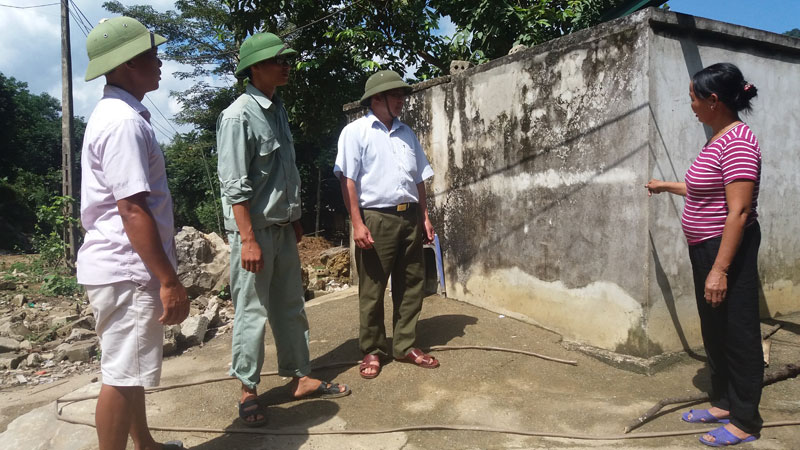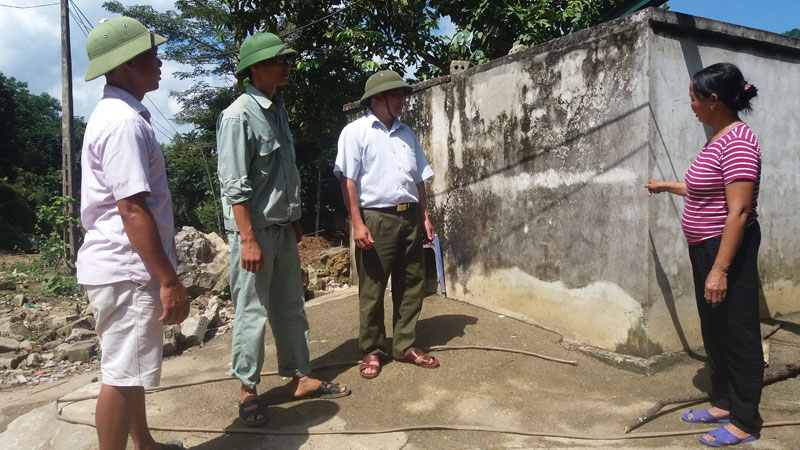
(HBO) – Local residents living along provincial Road 435 (Binh Thanh - Thung Nai - Ngoi Hoa, Tan Lac district) have agreed to facilitate land clearance in service of the road construction.

Bui Thi Hanh’s family in Ne
hamlet, Ngoi Hoa commune hands over land to the authority.
Road 435 has nearly 9 km running through Mu, Ne, Buong, Ngoi and
Liem hamlets in Ngoi Hoa commune. About 200 local households have to relocate their
assets and crops due to the construction. The land clearance work has basically
been completed, even ahead of the schedule set by the Chairman of the
provincial People’s Committee, under which at least half of the site in Tan Lac
district must be cleared by the end of September 2018. Although local residents
have yet to get compensation, they have handed over space to the project’s
investor and constructor.
Ngoi Hoa has well performed the communication work to encourage
officials, Party members and residents to support and abide by policies and
guidelines of the province, and move their assets, crops and houses in order to
create favourable conditions for the constructor to implement the project.
Apart from publicising compensation methods, commune authorities have also
followed measurement regulations in land clearance. Ngoi Hoa decided to ratify
the compensation estimate at about 16 billion VND.
The project on upgrading Road 435 was approved by the provincial
People’s Committee under Decision No. 1644/QD-UBND dated August 30, 2017, with
a total investment capital of 756 billion VND through Government bonds during
the 2016-2020 period. Of the sum, the province’s capital is 56 billion VND.
A total 21.18km of the road have been upgraded under Level-3
standards which are set for mountainous areas with a designed speed of 60km/h.
It starts from the Binh Thanh intersection to Thung Nai in Cao Phong district,
and ends in Liem hamlet, Ngoi Hoa commune, Tan Lac district. The project has
received 630 billion VND, of which 150 billion VND in 2017.
According to data from the Hoa Binh Provincial Party Committee, the industrial production index for the first six months of 2025 is estimated to have increased by 20% compared to the same period last year. This marks the highest year-on-year growth rate for this period since 2020.
In the first six months of 2025, Hoa Binh province’s export turnover was estimated at 1.145 billion USD, marking an 18.11% increase compared to the same period in 2024. Import turnover was estimated at $ 804 million, a 17.15% increase, which helped the province maintain a positive trade balance.
The lives of the ethnic minority farmers in Tan Lac district have gradually improved thanks to the new directions in agricultural production. This is a testament to the collective strength fostered through the professional associations and groups implemented by various levels of the district’s Farmers’ Union.
With the motto the "product quality comes first,” after nearly one year of establishment and operation, Muong village’s Clean Food Agricultural and Commercial Cooperative, located in Cau Hamlet, Hung Son Commune (Kim Boi district), has launched reputable, high-quality agricultural products to the market that are well-received by consumers. The products such as Muong village’s pork sausage, salt-cured chicken, and salt-cured pork hocks have gradually carved out a place in the market and they are on the path to obtaining the OCOP certification.
In the past, the phrase "bumper harvest, rock-bottom prices" was a familiar refrain for Vietnamese farmers engaged in fragmented, small-scale agriculture. But today, a new spirit is emerging across rural areas of Hoa Binh province - one of collaboration, organisation, and collective economic models that provide a stable foundation for production.
Maintaining growing area codes and packing facility codes in accordance with regulations is a mandatory requirement for agricultural products to be eligible for export. Recently, the Department of Agriculture and Environment of Hoa Binh province has intensified technical supervision of designated farming areas and packing facilities to safeguard the "green passport" that enables its products to access international markets.



